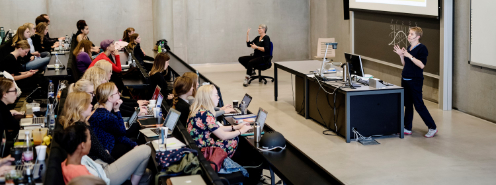Family background and returns to education
Education is widely seen as benefitting individuals in terms of their economic life prospects. But do all benefit equally from education? This project examines this question, focusing on differences across social background and across periods in the development of the Danish welfare state.

(See Danish summary below)
The project examines how the labor market returns to schooling varies across social background and whether this pattern in the returns to schooling has changed with the rise of the comprehensive Danish welfare state.
The project is based on data from virtually all twins born in Denmark from 1931 through 1979. The project tests the hypothesis that over time social background should play less of a role in determining the labor market benefits that people reap from education. The project is expected to provide new insights into the way we think about education as a promoter of social mobility.
The team is lead by Associate Professor Kristian Bernt Karlson. Professor Mads Meier Jæger is a collaborator. The project is also collaborating with the Danish Twin Registry which provide access to the unique data on virtually all twins born 1931-1979. The Danish Twin Registry is the oldest of its kind in the world and it provides a very unique opportunity to study the processes and mechanisms of social mobility.
The project’s empirical design is based on identical (monozygotic) twins and is known as “twin fixed effects models” in the research literature. The project uses the identical twins to gauge the labor market returns to completing a given level of education. Identical twins share all of their genetic make-up and also their upbringing environment. For this reason, we would expect twins to be very similar in terms of their education attainment and labor market outcomes. Given these considerations, the basic idea of the empirical design is the following: If two identical twins obtain different levels of education and the one with the better labor market outcome is the one with the highest level of education, then we can attribute their different labor market outcomes to their difference in schooling – and not to common confounders such as shared genetic makeup or shared upbringing environment. This conclusion depends on some assumptions, and the project pursues different ways of validating these assumptions.
International forskning viser, at den sociale arv i uddannelse er blevet mindre i løbet af de sidste 50 år i en række europæiske lande. Resultatet tyder på, at de store uddannelsesreformer, som har karakteriseret denne periode, har givet arbejderklassens børn bedre muligheder for at få sig en uddannelse. Et uafklaret spørgsmål i forskningslitteraturen er imidlertid, om arbejderklassens børn får et lige så stort afkast på arbejdsmarkedet af at tage en uddannelse som middelklassens børn. Hvis arbejderklassens børn får mindre ud af at tage en uddannelse, har de store uddannelsesreformer måske ikke formået at skabe mere social mobilitet i samfundet. Projektet undersøger på den baggrund, om afkastet af at tage samme uddannelse varierer med socialt ophav, samt om dette mønster har ændret sig i løbet af et halvt århundrede i Danmark. Projektets empiriske analyse baserer sig på over 30.000 tvillingepar, som er født i perioden 1931-1979. Datamaterialet giver en enestående mulighed for at estimere afkastet af uddannelse og samtidig studere, hvordan afkastet varierer med socialt ophav og over forskellige fødselskohorter. Projektets resultater forventes at udfordre den udbredte forståelse af, at uddannelse er den primære nøgle til at fremme den sociale mobilitet i de vestlige demokratier.
Researchers
| Name | Title | Phone | |
|---|---|---|---|
| Search in Name | Search in Title | Search in Phone | |
| Kristian Bernt Karlson | Professor | +4535321588 | |
| Mads Meier Jæger | Professor | +4535323284 |
Funded by:

The project is funded by the Independent Research Fund Denmark (Danmarks Frie Forskningsfond)
Project: Family background and returns to education
Period: 2018-2022
Contact
Kristian Bernt Karlson (PI)
Department of Sociology
Mail: kbk@soc.ku.dk
Telefon: 35 32 15 88
External members:
| Name |
|---|
| The Danish Twin Registry |
